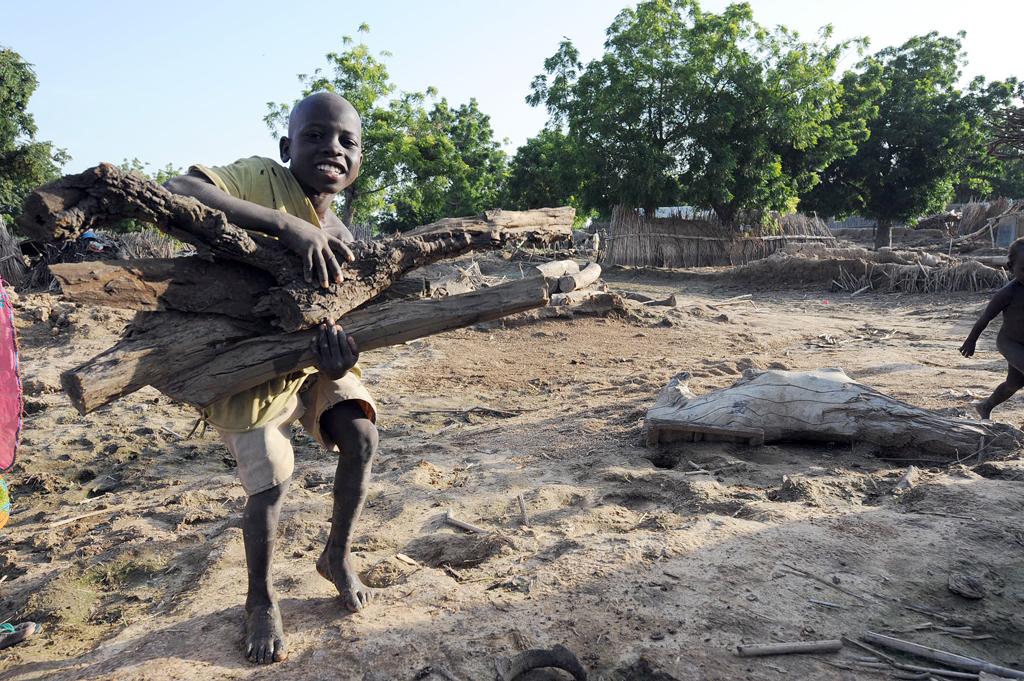Nigeria’s silent killer: its energy shortage
A boy in Ringim district of Jigawa state on Sept. 26, 2010.
ABUJA, Nigeria — Outside a small cafe on a sunny patch of dirt, women stir vats of beans over fires. The pots each balance on three stones over the burning wood, and smoke billows around the cooks.
Like many Nigerians, restaurant owner Omolara Okunoye does not know about diseases associated with wood-burning fires. But activists call them the “silent killers” of people and of Nigeria’s environment.
But like many cooks, Okunoye says her eyes constantly hurt.
“It heats the eyes,” she says as she chops okra into a blue plastic bowl. “When it heats the eyes it can cloud the vision after a long period of time. If a person doesn’t get treatment, they won’t be able to see.”
After malaria and AIDS, Nigeria's number three cause of death are diseases associated with smoke inhalation from traditional cooking, which kill close to 100,000 people a year, according to Ewah Otu Eleri, the executive director of the International Center for Energy, Environment and Development in Nigeria.
“Here you have a problem that compounds on itself,” said Eleri of Nigeria's chronic energy shortages. “Every day that passes, we lose lives.”
Many Nigerians are unaware of the dangers. Eleri’s organization is lobbying the Nigerian government to implement policies that increase the supply of — and demand for — safer stoves.
Nigeria is Africa's largest oil producer, but suffers from a perplexing shortage of power. The 2.4 million barrels of crude pumped a day do not translate into energy that ordinary Nigerians can use. The country's electric plants are inadequate and dilapidated. More than half the 160 million people live without power. Those who are on the grid cope with daily power blackouts. Even using gas and kerosene stoves is expensive, because Nigeria does not have sufficient refineries and must import the fuels.
More from GlobalPost: West Africa struggles against coups
Nigeria’s “acute” energy shortage is the root cause of a slew of health hazards, including heart and lung problems linked to traditional wooden stoves, said Sam Amadi, the chairman of the Nigerian Electricity Regulatory Committee.
And the problem involves more than just cooking.
In urban slums, anyone who can afford it has a small generator in their one-room apartment, he said. These are dangerous, and death from smoke inhalation and explosions is common, according to Amadi.
“This is a national menace and a real health threat in the country,” he said.
Amadi said Nigeria currently produces less than 4,000 megawatts of electricity. In comparison, the US, with roughly twice as many people as Nigeria, has a capacity nearly 280 times larger than Nigeria’s. About 80 percent of Nigeria's power is from gas power plants and the remainder in hydropower from dams. The poor state of Nigeria’s power grid means there are frequent blackouts.
“For many decades, Nigeria has not invested in generating capacity.” But, he added, that is about to change.
President Goodluck Jonathan's government is currently implementing an ambitious plan to quadruple Nigeria’s power supply over the next few years by privatizing the industry, which is currently run by the state. Amadi said 50 new energy companies have already been licensed, and the country is seeking new investors.
Some Nigerians complain that the country exports energy to its neighbors, while people suffer at home. Amadi explained that Nigeria exports no more than 200 megawatts, often as part of agreements that allow the country to make use of shared natural resources, like the hydropower dam on a river shared by Niger and Nigeria.
More: US pledges support for Nigeria against Islamist extremists
One new power plant should be up and running within a year, according to Abubakar Sani Sambo, the director general of the Energy Commission of Nigeria, but the privatization plan does have its detractors and challenges. He says government electricity employees fear they will lose jobs and pensions.
“There is a lot of apprehension and anxiety in the minds of workers in the electricity sector,” he said.
Despite the fears, Sambo said supplying Nigeria with enough power is critical to making Nigeria healthier and safer.
“Darkness in the night perpetrates evil,” he said. “Security problems are heightened." He also said more widely available electric power could spur economic growth. "With less electricity you have less jobs, and less business activity,” Sambo said.
He said Nigeria's power shortage scares away international investors.
For Sambo, however, the fact that Nigerians cook with wood-burning stoves may prove more dangerous in the future than it already is. The lack of home energy has caused a rapid deforestation that has seen the Sahara Desert advance in Nigeria's populated areas.
“Over the entire country, 65 percent of households rely on firewood,” he said. “If that is not changed the entire country will become a desert in the not-too-distant future.”
More from GlobalPost: Economic growth pulls Rwandans from poverty
